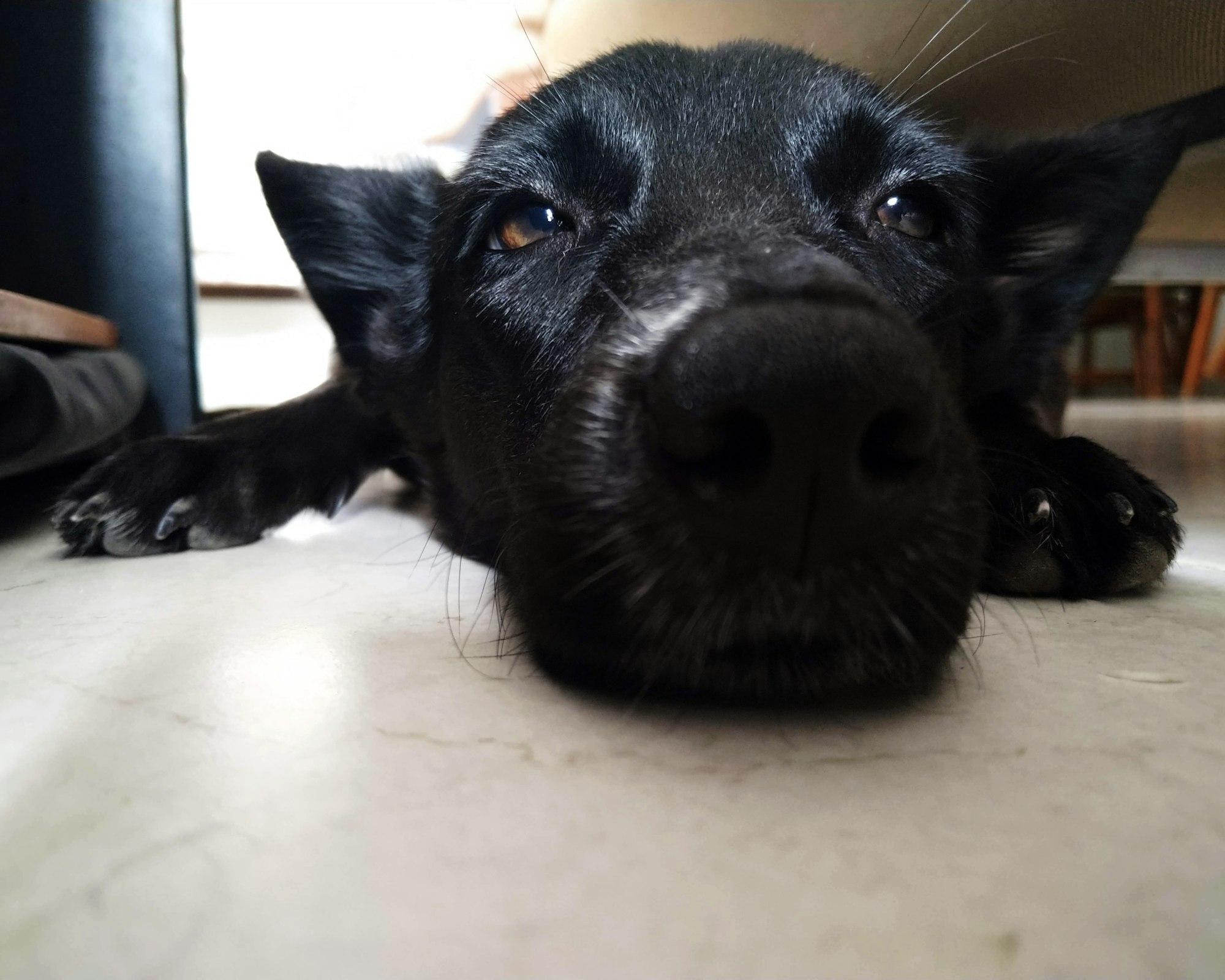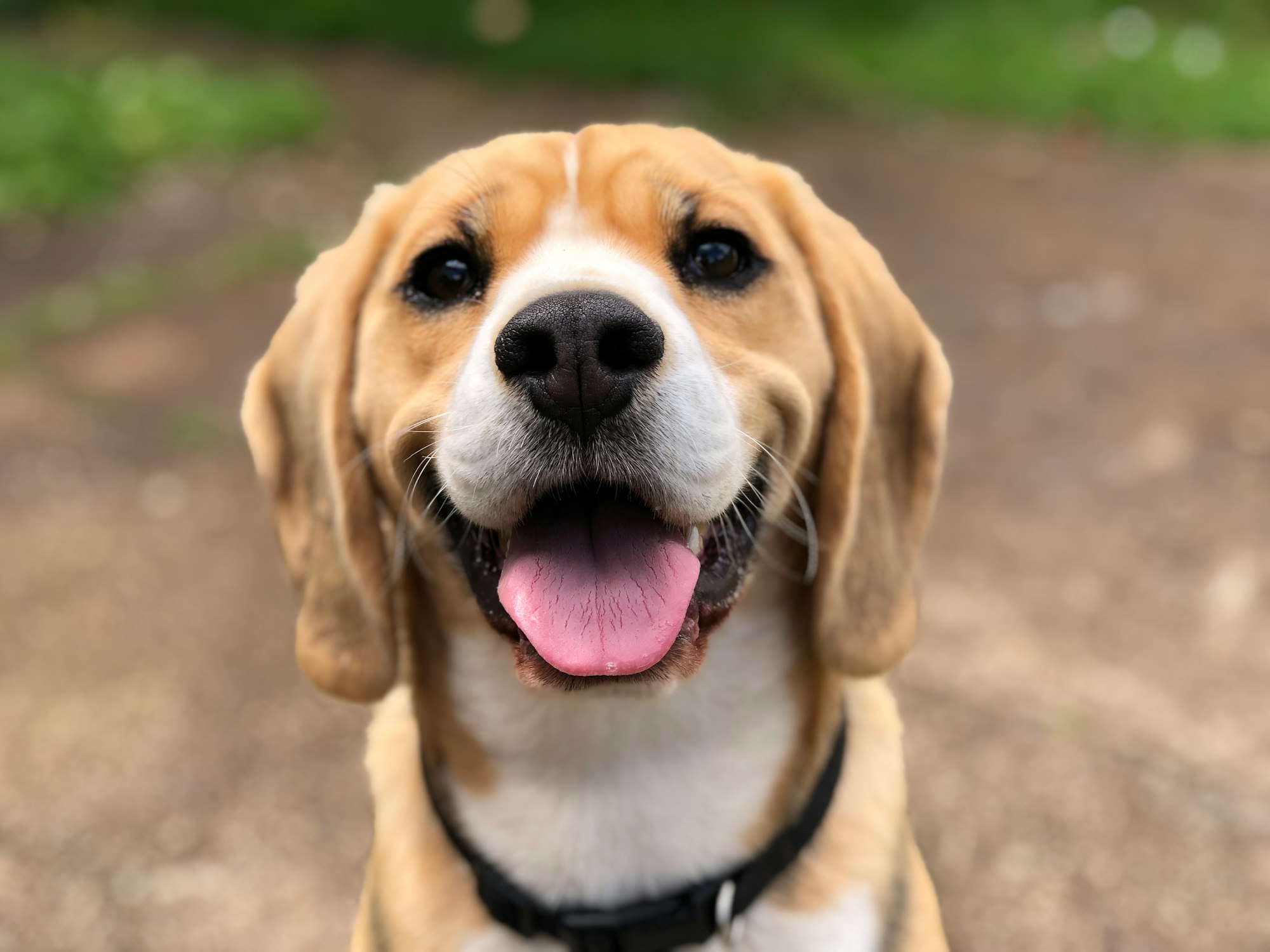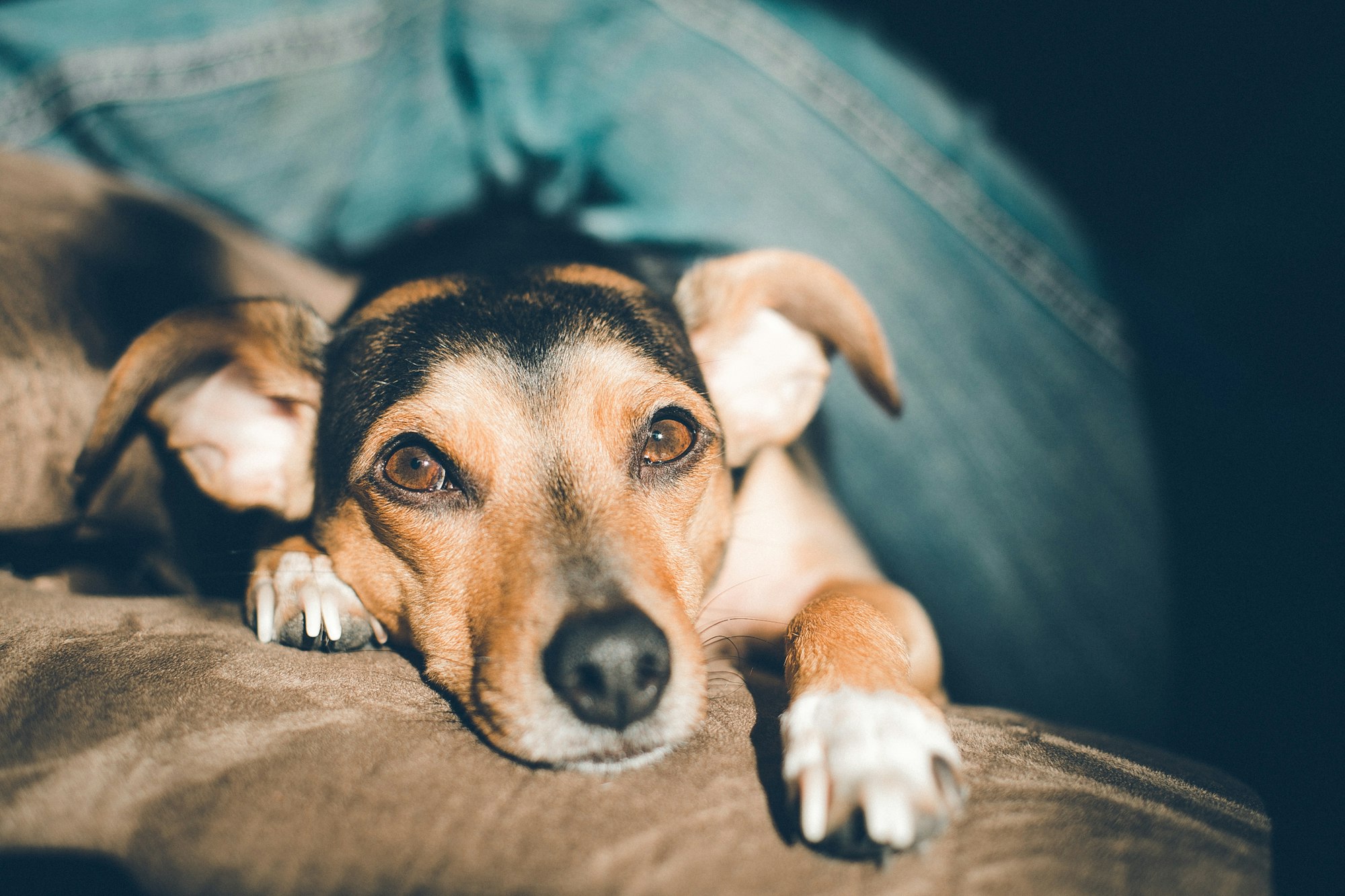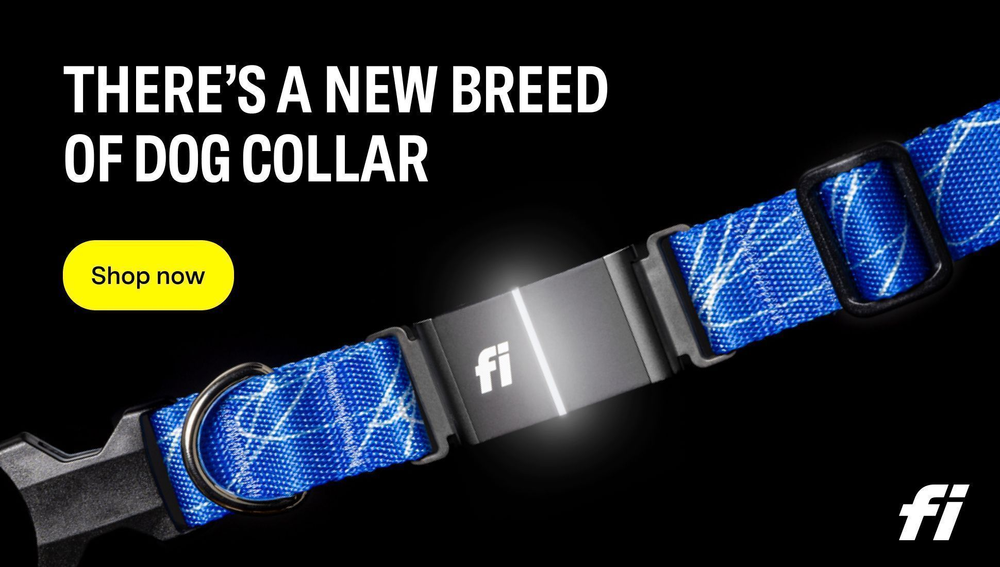When it comes to our furry companions, dogs, we often find ourselves marveling at their quirks and behaviors. One such peculiar occurrence is the presence of hiccups in dogs. You may have noticed your canine friend suddenly making a sound that's not quite a bark, yet not a cough either. In this article, we'll dive into the intriguing world of canine hiccups – what causes them, whether they're normal, and how you can address them.

What Are Dog Hiccups?
Dog hiccups are involuntary contractions of the diaphragm, a muscle responsible for breathing. These contractions cause a sudden intake of air, resulting in the distinctive "hic" sound. It's important to note that hiccups in dogs are different from those in humans; while human hiccups can last for a prolonged period, dog hiccups are typically short-lived.
Causes of Canine Hiccups
A Mismatched Mealtime
Sometimes, hiccups occur when a dog's mealtime is not synchronized with its activity level. Feeding your happy dog right before or after vigorous play can lead to hiccups.
Rapid Eating or Drinking
Dogs known for their voracious appetites might gulp down their food or water too quickly. This rapid consumption can introduce air into their stomachs, triggering hiccups.
Excitement and Stress
Just like humans, dogs can get excited or stressed. These emotional states can also lead to hiccups. Whether it's meeting new people or experiencing changes in their environment, dogs can hiccup due to heightened emotions.
Temperature Changes
Abrupt changes in temperature, such as going from a warm indoors to a chilly outdoor environment, can lead to hiccups. This is especially common during colder months.
Are Hiccups Normal for Dogs?
In most cases, hiccups are entirely normal and harmless for dogs. Puppies, in particular, are more prone to experiencing hiccups as their bodies are still developing and adapting to various stimuli.

Should You Be Concerned?
When to Monitor
If your dog experiences occasional hiccups that last for a few minutes, there's generally no need to worry. However, if the hiccups persist for an extended period or occur frequently, it's a good idea to keep an eye on your furry friend.
When to Consult a Vet
If your dog's hiccups are accompanied by other concerning symptoms, such as difficulty breathing, lethargy, or loss of appetite, it's advisable to seek veterinary attention. While hiccups themselves are usually harmless, they could sometimes indicate an underlying health issue.

Tips to Prevent and Manage Hiccups
Adjust Mealtime Routine
To prevent hiccups triggered by mealtime, consider adjusting your dog's feeding schedule. Try to feed your dog when it's in a calm state, rather than immediately before or after energetic activities.
Slow Down Eating
For dogs that tend to eat too quickly, consider using puzzle feeders or slow-feed bowls. These tools can help slow down their eating pace, reducing the likelihood of swallowing excess air.
Create a Calm Environment
Reducing stress and excitement can also help prevent hiccups. Create a peaceful and comfortable environment for your dog, especially during mealtime.
Maintain Stable Temperatures
Since temperature changes can trigger hiccups, ensure that your dog's living environment remains relatively stable. During colder months, consider using blankets or coats to keep your furry friend warm during outdoor excursions.
Can Puppies Get Hiccups Too?
Yes, puppies can indeed experience hiccups. Just like human infants, puppies are still growing and developing, and their bodies are adapting to various sensations and experiences. This includes their respiratory and digestive systems, which can sometimes result in hiccups. Puppies are known for their boundless energy and enthusiasm, which can sometimes lead to rapid eating or drinking. This, coupled with their developing muscles and nerves, can trigger hiccups. While it might seem alarming at first, puppy hiccups are generally harmless and tend to decrease as they mature into adult dogs. If your puppy experiences hiccups, there's no need to worry – simply let the hiccups run their course, and your little furball will likely be back to their playful self in no time.
Can Hiccups Indicate Health Issues?
In most cases, hiccups in dogs are nothing to be overly concerned about. They are a natural physiological response that occurs due to the contraction of the diaphragm muscle. However, while hiccups themselves are usually harmless, they can occasionally be indicative of underlying health issues, especially if they are persistent or accompanied by other concerning symptoms. If your dog experiences frequent or chronic hiccups, particularly if they are associated with difficulty breathing, lethargy, loss of appetite, or any other unusual behaviors, it's advisable to consult with a veterinarian. These symptoms could potentially be related to other health problems, such as gastrointestinal issues, respiratory concerns, or even heart problems. It's always better to err on the side of caution and seek professional advice to ensure the well-being of your furry friend.

Addressing Hiccups in Brachycephalic Breeds
Brachycephalic breeds, characterized by their distinctive flat faces and short noses, are undeniably charming and adorable. However, their unique anatomy can sometimes make them more prone to certain health issues, including hiccups. Brachycephalic dogs often have narrower airways and elongated soft palates, which can affect their breathing patterns and make them more susceptible to hiccups.
Due to their compromised respiratory structures, brachycephalic breeds might experience hiccups more frequently compared to their non-brachycephalic counterparts. When these breeds gulp air quickly or become excited, it can trigger hiccups due to the interaction between their unique anatomy and rapid breathing.
If you have a brachycephalic dog, it's critical to be mindful of their hiccups and any potential breathing difficulties. While occasional hiccups are generally not cause for concern, if your brachycephalic syndrome experiences persistent hiccups or shows signs of respiratory distress, it's wise to consult your veterinarian. These adorable breeds require special attention and care to ensure their well-being, and addressing their hiccups is just one aspect of that holistic care approach.
The Role of Hydration
Hydration is a key factor in maintaining the overall health and well-being of your furry friend. Just like humans, dogs require an adequate amount of water to function properly. Proper hydration plays a significant role in preventing various health issues and can even have an impact on reducing the occurrence of hiccups.
Step 1: Understand the Importance of Hydration
Water is essential for a dog's bodily functions, including digestion, circulation, and temperature regulation. Without sufficient water intake, good family dogs can become dehydrated, which can lead to a range of health problems.
Step 2: Provide Access to Fresh Water
Make sure your dog has access to clean and fresh water at all times. Especially during hot weather or after physical activities, your dog's water intake should increase to compensate for fluid loss.
Step 3: Hydration and Hiccups
Proper hydration can help prevent hiccups in dogs. When a dog is adequately hydrated, the diaphragm muscles are less likely to contract involuntarily, reducing the likelihood of hiccups.
Step 4: Offer Water During Hiccups
If your dog is experiencing hiccups, offering a small amount of water can be beneficial. This can help soothe the irritation in the diaphragm and potentially alleviate the hiccups more quickly.
The "Old Dog" Factor
Just like humans, dogs undergo various changes as they age. These changes can affect their physical health, behavior, and even their susceptibility to certain occurrences, including hiccups.
Step 1: Recognize the Aging Process
As dogs get older, their bodies naturally change. These changes can include a decrease in muscle tone, changes in metabolism, and alterations in their immune system.
Step 2: Potential Changes in Hiccups
Older dogs might experience hiccups more frequently due to the changes in their bodies. Their diaphragm muscles might become more sensitive or prone to contractions, leading to the occurrence of hiccups.
Step 3: Regular Check-ups
As your dog ages, regular veterinary check-ups become even more significant. These check-ups can help monitor your older dog's overall health, including any changes in hiccups.
Step 4: Special Care for Seniors
Provide your senior dog with a comfortable and supportive environment. This might include softer bedding, joint supplements, and a well-balanced diet that caters to their changing nutritional needs.
Step 5: Addressing Health Changes
If your older dog experiences hiccups along with other concerning symptoms, consult your veterinarian. These symptoms might be indicative of underlying health issues that are more common in senior dogs.
Understanding the impact of hydration and the changes that come with age can help you provide the best care for your canine companion, ensuring they lead a happy and healthy life throughout their senior years.
Natural Remedies for Hiccups
Hiccups in dogs can be a minor inconvenience, but luckily, there are several natural remedies you can try to help ease them. These remedies are simple and can often provide quick relief without resorting to medication.
Step 1: Gently Massaging
Gently massaging your dog's chest can help relax the diaphragm muscles, which are responsible for the hiccup contractions. Use your fingertips to apply gentle pressure and circular motions. This can promote relaxation and potentially reduce the frequency of hiccups.
Step 2: Offering Water
Providing your dog with a small amount of water can help soothe the irritation in the diaphragm. This can be particularly effective if your dog's hiccups are triggered by swallowing air while eating or drinking too quickly. Just ensure the water is at room temperature to avoid any sudden temperature changes that could potentially trigger more hiccups.
Step 3: Distraction
Sometimes, distracting your dog can help shift their focus away from the hiccups. Engage your dog in an activity they enjoy, such as playing with their favorite puzzle toys or going for a short walk. The mental and physical engagement can sometimes interrupt the hiccup cycle.
Step 4: Patience
In many cases, hiccups in dogs are short-lived and resolve on their own. Sometimes, the best remedy is simply to wait it out. Keep a close eye on your dog and ensure they are comfortable. Most hiccups will subside within a few minutes.
Step 5: Monitor and Consult
While these natural remedies can be effective for occasional hiccups, it's crucial to monitor your dog's overall health. If your dog experiences frequent or chronic hiccups, or if they are accompanied by other concerning symptoms, consult with a veterinarian. Persistent hiccups could sometimes indicate underlying health issues that require professional attention.
Remember, hiccups in dogs are usually harmless and a normal part of their physiology. However, if you ever feel uncertain or if your dog's hiccups are causing distress, don't hesitate to seek guidance from a veterinary professional.

Conclusion
In most cases, hiccups in dogs are a normal and temporary occurrence. While they may seem unusual or even concerning, they rarely pose a significant threat to your canine companion's health. By understanding the potential causes, prevention methods, and when to seek veterinary care, you can ensure that your furry friend remains happy and healthy.
FAQs (Frequently Asked Questions)
Here are some frequently asked questions (FAQs) about dogs and hiccups:
- Q1: Are hiccups in dogs the same as in humans?
- A: No, hiccups in dogs are not the same as in humans. While the mechanism of diaphragmatic contractions is similar, the underlying causes and frequency can differ between the two species.
- Q2: Should I be worried if my dog has hiccups after every meal?
- A: Not necessarily. Occasional hiccups after meals are usually normal and harmless. However, if your dog's hiccups are persistent or accompanied by other symptoms, it's a good idea to consult a veterinarian for peace of mind.
- Q3: Can I give my dog water during hiccups?
- A: Yes, offering your dog a small amount of water during hiccups can be helpful. It can soothe the irritation in the diaphragm and potentially alleviate the hiccups.
- Q4: Why do brachycephalic breeds experience hiccups more often?
- A: Brachycephalic breeds, with their unique facial structure, are more prone to hiccups due to their respiratory anatomy. Their shorter noses and elongated soft palates can contribute to more frequent hiccups.
- Q5: Is it true that hiccups can be a sign of a heart problem?
- A: While rare, persistent hiccups could potentially be linked to an underlying health issue, including heart problems. However, in most cases, hiccups are benign. If you're concerned, consult a vet for an accurate assessment.
These questions address common concerns about hiccups in dogs and offer insight into their nature and potential causes. If you have additional queries or if your dog's hiccups are causing worry, reaching out to a veterinarian can provide clarity and appropriate guidance.




